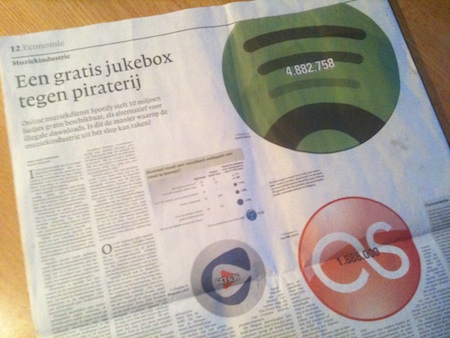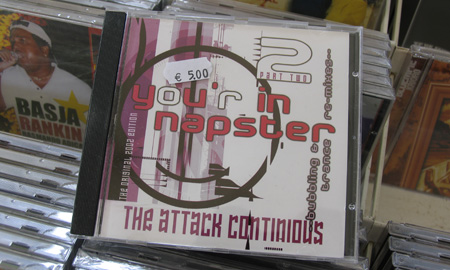Last Wednesday I attended the launch of ‘Adieu auteursrecht, vaarwel culturele conglomeraten‘ the new book by Joost Smiers. In this book he argues that (a) copyright is harmful, because it has led to large conglomerates dominating the production of culture and that (b) the world would be better off without copyright because it would be better of without these conglomerates and therefore (c) copyright needs to be abolished and the conglomerates must be broken apart. According to Smiers and his co-author Marike Schijndel this will lead to a level playing field for artists and other cultural producers and result in both a more diverse culture and better abilities for artists and cultural producers to live off their work.
Now I have not read his book yet, but I have listened to Smiers for a number of times, and he always looses me at the point where he assumes that the absence of copyright and conglomerates will quasi automatically lead to a more just distribution of attention and wealth among artists and cultural producers.
Regardless of his rather haphazard line of argumentation the public at the Balie seemed to like his ideas a lot (not really surprising since just about everybody can agree on the fact that the current copyright system is not working very well in ensuring that artists can live of their work, and the public that frequents these kind of events sure loves to see the blame laid on American cultural conglomerates) and there was no real discussion about the validity of his analysis or the nature of the ‘new business models’ that Smiers and Schijndel predict to emerge once we have gotten rid of copyright and the conglomerates (the last one being a bit of a shame).
During the non-debate (you were assumed to argue form a the perspective of a society without copyright and conglomerates) a number of people came up with arguments against copyright that were based on a variation of the argument that copyright restricts dialogue and is therefore a constraint on artists practices.
This argument is very much in line with a recent paper by the Canadian copyright scholar Abraham Drassinower. In ‘Authorship as Public Address: On the Specificity of Copyright vis-a-vis Patent and Trade-Mark‘ Drassinower makes the argument that “copyright is not about copying, pure and simple” [p.205] but rather about the right of an author to be associated with his work. Or to put it in Drassinowers own, more legalistic language:
Thus, copyright is less an exclusive right of reproduction than an exclusive right of public presentation. [p.221]
Drassinower arrives at this conclusion by examining the differences between copyright law, patent protection and trademarks. From these differences he tries to distill which particular kind of wrongdoing copyright law sanctions and tries to prevent. According to Drassinower this is not the simple unauthorized use of the a copyrighted work by persons other than the author or his agents, but a very specific form of use:
Put in terms of copyright doctrine, we need to understand (1) that originality is not about the absence of use, (2) that fair dealing is not about the absence of originality, and (3) that therefore originality and fair dealing are not opposing impulses or exceptions to each other, but rather radically continuous and integral aspects of copyright law as a whole. The fundamental problem is that of grasping the nature of the continuity. […] Thus, copyright is less about a prohibition on copying per se than about a distinction between permissible and impermissible copying—that is, between saying things in one’s own words and merely repeating the words of another. Authorship is less about the absence of copying than about the cultivation and exercise of modes of imitation that amount to more than mere repetition. Copyright law can no more prohibit copying per se, than it can prohibit authorship. [p.208-9]
According to Drassinower the fact that copyright law regulates cultural production which he (and many of the participants in the discussion following the book launch in the Balie) sees as a form of speech (or dialogue) means that copyright law can’t exclude others from using protected works as part of their own engagement in this dialogue: “… Persons are entitled to use the works of others provided such use is consistent with the equal authorship of those others” [p.213]. According to this conceptualization of copyright law no harm to the original author is done as long as I do not present someone else’s work as my own work, but rather use it in a way where it is instrumental to my own undertakings.
This gets more interesting once Drassinower expands this argument and applies it to other types of activities regulated by copyright law. In the 2nd part of his paper he applies his concept to copying in the digital context and comes to the conclusion that the mere making of digital should not trigger copyright law, since it rarely happens in order to communicate the copied works as a work:
The distinction between the reproduction of a work in the physical sense and its reproduction as a work in the normatively relevant sense is also at play in the ongoing encounter between copyright law and digital technology. It is generally accepted, for example, that Internet browsing— which requires the making of temporary copies—is legal on the grounds that by posting the work online, the poster is granting an implied license to others to reproduce that work in order to view it. […] Whereas the implied license and public interest approaches more or less successfully cloak the rupture between copyright law and digital technology, the authorship as public address approach interprets the legal significance of technology from the viewpoint of a renewed understanding of the law – that is, of the nature of the right and wrong at issue. Because it dislocates the centrality of reproduction as the organizing principle of copyright law, the authorship as public address approach can find that the reproductions involved in browsing and caching do not amount to uses of the work as such. Instead, since browsing and caching are neither implied licensing nor public interest exceptions, they constitute user rights precisely because they amount to non-authorial use. [p.227]
While Drassinower’s paper is somewhat complicated and lengthy I do think that his approach is well suited to bring copyright law back into line with reality: In a time where copying is one of the most basic cultural technologies it is more and more absurd (and inefficient) that copyright law even attempts to regulate the mere making of copies. The beauty of Drassinowers argument is that he does not depart from this observation but rather arrives at the conclusion that copyright law cannot be about the regulation of copies by looking at the balance between user and author rights. By framing the subject matter of copyright as ‘dialogue’ between author/users and user/authors he saves copyright law from falling prey to the explosion of everyday copying.




